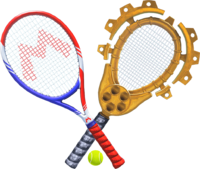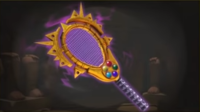Lucien: Difference between revisions
7feetunder (talk | contribs) (Undo revision 4306576 by Pokemon (talk) not enough of a similarity to warrant comparing two villains from two extremely unrelated games released a decade apart) Tag: Undo |
|||
| Line 42: | Line 42: | ||
|SpaM=Same as Dutch | |SpaM=Same as Dutch | ||
}} | }} | ||
{{MTA}} | {{MTA}} | ||
Revision as of 11:31, July 22, 2024
| Lucien | |
|---|---|
 Lucien alongside Mario's racket | |
| First appearance | Mario Tennis Aces (2018) |
Lucien is an ancient tennis racket with the power to control people. It appears as the main antagonist of Adventure Mode in Mario Tennis Aces.
History
According to Aster, many years before Mario Tennis Aces, King Bask heard of Lucien's power and took it for himself, only for it to destroy the ancient Kingdom of Bask. However, King Bask managed to strip Lucien of its power and divided the power between five Power Stones, and he hid Lucien in a secret room.
In the beginning of Adventure Mode, Wario and Waluigi, who found Lucien while digging in the Bask Ruins, give it to Mario and Peach as a "prize" for winning the championships. Despite Toad warning him, Luigi takes the racket, causing him to be possessed by Lucien just like Wario and Waluigi, forcing Mario to go and get the five Power Stones before Lucien does. Toad accompanies Mario in doing this.
Mario and Toad manage to obtain three of the Power Stones, but the possessed Wario and Waluigi take the other two. The group decide to have a tennis tournament in Marina Stadium for the Power Stones. Peach and Daisy need to defeat the possessed Wario and Waluigi, while Mario needs to defeat the possessed Luigi. After Mario and his allies win, Bowser takes Lucien and the five Power Stones for himself, and brings them to the Temple of Bask Shrine. Lucien and Bowser combine to form Bowcien, who then challenges Mario. However, Mario defeats them, breaking Lucien with a Zone Shot in the process. Lucien's remains emit powerful energy, which causes the shrine to crumble and nearly cave in on Mario, but he is teleported out safely before he can be crushed by the falling debris.
Afterwards, Mario, Luigi, Peach, Toad, and Daisy celebrate Lucien's destruction, although Wario and Waluigi express disappointment in it happening, as they hoped to become the best tennis players with the racket. Daisy scolds Wario and Waluigi by reminding them of how all the events, including their possession, had been the result of their trying to use Lucien, as well as the fact that Lucien's powers were ultimately no match for Mario anyway.
Later, Mario and Toad go to the recently appeared Ruins of Trials, where Mario eventually completes the King's Trial (the Last Trial Boss Challenge, where Mario defeats all of the bosses, including Bowcien, in successive rematches) and obtains a non-sentient replica of Lucien as a reward. This replica can then be used when playing as Mario outside of Adventure mode.
Names in other languages
| Language | Name | Meaning | Notes |
|---|---|---|---|
| Japanese | エスター[?] Esutā |
Aster | |
| Chinese (simplified) | 圣德芬[?] Shèngdéfēn |
From「圣」(shèng, "holy") and a pun on「得分」(défēn, "score") | |
| Chinese (traditional) | 聖德芬[?] Shèngdéfēn |
From「聖」(shèng, "holy") and a pun on「得分」(défēn, "score") | |
| Dutch | Lucius[?] | The Roman name "Lucius" could either derive from lux ("light" in Latin), whereby the name would be related to Lucifer, or descend from the Etruscan lucumo ("king") | |
| French | Jeseth[?] | Pronounced like jeu, set ("game, set"); also derived from "Seth" | |
| German | Luzius[?] | A corruption of the Dutch name | |
| Italian | Lucigna[?] | Based on the Italian name of Candlewick (Lucignolo) from The Adventures of Pinocchio | |
| Russian | Лукий[?] Lukiy |
Lucius | |
| Spanish | Lucius[?] | Same as Dutch |
